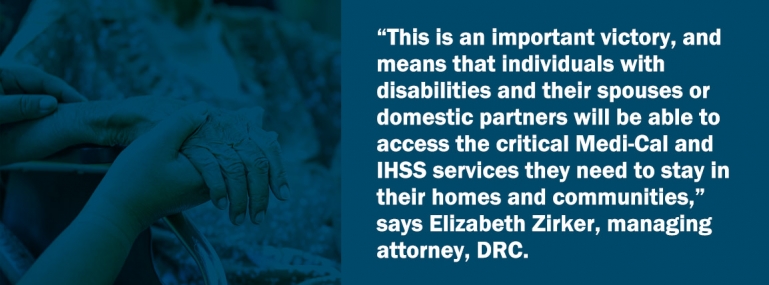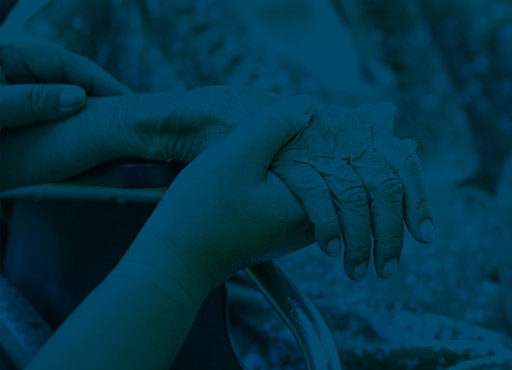California plaintiffs win case against state for failing to provide federally-mandated In-Home Supportive Services

California plaintiffs win case against state for failing to provide federally-mandated In-Home Supportive Services

(LOS ANGELES, CA) - Thousands of Medi-Cal beneficiaries with significant disabilities will now be able to access affordable Medi-Cal care at home, rather than going to a nursing facility. In-home care provides greater stability and health outcomes for individuals and families, and it is cost-effective for the state; but it can be prohibitively costly to pay for out-of-pocket. As a result, married people with disabilities often have to make a draconian choice: impoverish themselves and their spouses or go to a nursing facility.
“My wife and I live primarily on a fixed income of pensions and social security; we exhausted our life savings and retirement accounts paying for my care,” said plaintiff Patrick Kelley, a 68-year-old U.S. Army veteran living with spastic quadriparesis. “My wife’s ability to work was severely limited by her caregiving responsibilities to me. We spent almost all of her limited income paying for my in-home care.”
Thanks to the successful lawsuit against the state, married people with disabilities will now learn about their right to Medi-Cal eligibility so they can stay at home with their spouse, receive care, and be reimbursed through the state’s Medi-Cal program for In-Home Supportive Services (IHSS). The court ruling makes it clear that the state must fully implement a federal law, known as the expanded spousal impoverishment protection, which should have been implemented as part of the Affordable Care Act in 2014.
“This ruling will dramatically improve the quality of life for disabled Californians and their family caregivers and will prevent many Californians from falling into poverty due to the high cost of in-home care,” said Kim Selfon, IHSS Client Advocate at Bet Tzedek. “Caregivers selflessly care for their disabled spouses with courage and compassion, often to the detriment of their own finances and health. They and thousands of others will now have the support they need to continue caring for their loved ones at home.”


The two plaintiffs’ situations illustrate the diversity of the thousands of individuals that will be impacted by the outcome of this case.
“The judge’s decision is a boost to Welfare and Institutions Code section 10500, which says agencies must secure for every person the aid to which they are entitled. As California’s population ages, in-home care will become increasingly important to the future of the state,” said attorney Cori Racela of Western Center on Law & Poverty.
Plaintiff Matthew Reed is a 63-year-old man with multiple sclerosis, Bell’s Palsy, and vascular dementia from a stroke. Due to the severity of his disabilities and medical condition, Mr. Reed is eligible for Medi-Cal home services, and should have had access to care without out-of-pocket costs under spousal impoverishment protections. Instead, he was required to pay more than $1,500 per month for care, which he cannot afford.
“If the spousal impoverishment rule had been implemented as it should have, Matthew could have been found eligible for free Medi-Cal and IHSS,” said Matthew Reed’s wife, Vicki Reed. “That means my son or I could have earned IHSS wages, sparing us incalculable stress and anxiety and giving us better options for Matthew's home care and more financial resources. I don't want any other families to go through what we have gone through.”
The Affordable Care Act set a deadline to expand spousal impoverishment protections to home-based care starting January 1, 2014. However, the Department of Health Care Services (DHCS) failed to issue any guidance about the rule until July 2017, after Mr. Kelley and Mr. Reed brought this lawsuit.
The ruling in Patrick Kelley & Matthew Reed v. California Department of Health Care Services, et. al., was issued by a Los Angeles Superior Court judge on January 14, 2020. It concludes that DHCS must a) notify beneficiaries who could benefit from the rule, particularly those denied or discontinued from Medi-Cal because DHCS failed to implement the rule on time; b) create a process for people to be found eligible for IHSS retroactively to the date they applied for Medi-Cal; and c) allow impacted individuals to be paid for home services they were entitled to during the delay period.
“Choosing between remaining at home without needed services, impoverishing oneself and one’s spouse, or moving into a facility separate from loved ones is no choice at all,” said Claire Ramsey, Senior Staff Attorney at Justice in Aging. “This ruling means relief for many who have struggled to stay at home and in their community and receive the services they need.”
Media Contacts:
For plaintiffs: Allison Lee: Bet Tzedek, alee@bettzedek.org, (310) 991-0373
Courtney McKinney: Western Center on Law & Poverty, cmckinney@wclp.org, (214) 395-2755
Melody Pomraning: Disability Rights California, Melody.Pomraning@disabilityrightsca.org, (916) 504-5938
Vanessa Barrington: Justice in Aging, vbarrington@justiceinaging.org, (415)-505-0116
About Bet Tzedek
Bet Tzedek is committed to providing free legal services to those that need them most. Bet Tzedek attorneys and advocates help people of all communities and generations secure life’s necessities. Wherever people are in crisis, Bet Tzedek’s core services and rapid response programs provide stability and hope. Founded in 1974, Bet Tzedek – Los Angeles’ House of Justice – helps over 50,000 people each year.
About Justice in Aging
Justice in Aging is a national organization that uses the power of law to fight senior poverty by securing access to affordable health care, economic security, and the courts for older adults with limited resources. Since 1972 we’ve focused our efforts primarily on fighting for people who have been marginalized and excluded from justice, such as women, people of color, LGBTQ individuals, and people with limited English proficiency.
About Disability Rights California
Disability Rights California (DRC) is the agency designated under federal law to protect and advocate for the rights of Californians with disabilities. The mission of DRC is to advance the rights, dignity, equal opportunities, and choices for all people with disabilities.
About Western Center on Law & Poverty
Western Center on Law & Poverty fights for justice and system-wide change to secure housing, health care, racial justice and a strong safety net for low-income Californians. Western Center attains real-world, policy solutions for clients through litigation, legislative and policy advocacy, and technical assistance and legal support for the state’s legal aid programs. Western Center is California’s oldest and largest legal services support center.





